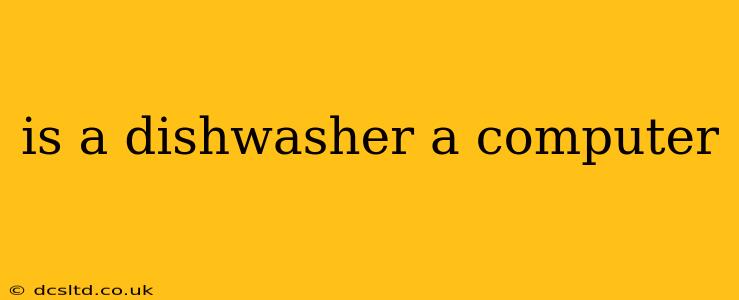Is a Dishwasher a Computer? Unpacking the Unexpected Comparison
At first glance, the question "Is a dishwasher a computer?" seems absurd. A dishwasher washes dishes; a computer processes information. However, a deeper look reveals surprising parallels and helps us understand the evolving definition of "computer." While a dishwasher isn't a computer in the traditional sense, exploring the connection reveals interesting insights into embedded systems and the expanding role of technology in everyday appliances.
What Makes a Computer a Computer?
Before diving into the dishwasher analogy, let's establish what defines a computer. Fundamentally, a computer is a programmable machine capable of accepting data (input), processing it according to a set of instructions (program), and producing a result (output). This processing involves logic operations, arithmetic calculations, and memory management. Modern computers often feature complex operating systems, user interfaces, and vast storage capabilities.
The Dishwasher's "Brain": Embedded Systems
While your dishwasher doesn't run Microsoft Windows or play video games, it does contain a sophisticated embedded system. This system is a specialized computer designed for a single purpose: controlling the dishwasher's functions. It uses a microcontroller – a tiny computer on a chip – to manage tasks such as:
- Monitoring water temperature and level: Sensors provide real-time data to the microcontroller, which adjusts heating elements and water intake valves accordingly.
- Controlling the wash cycle: The microcontroller follows a pre-programmed sequence of actions, including filling with water, dispensing detergent, rotating the spray arms, and draining the water.
- Timing the cycle: The microcontroller precisely times each step of the wash cycle to ensure optimal cleaning.
- User interaction: The control panel acts as a basic interface, allowing users to select wash cycles and options. The microcontroller interprets these inputs and adjusts the operation accordingly.
These functions are all controlled by a program residing in the microcontroller's memory. Although simpler than a general-purpose computer, this embedded system demonstrates the fundamental principles of computing: input, processing, and output.
So, Is It a Computer? A Matter of Perspective
The answer to the question hinges on the definition of "computer." If we strictly define it as a general-purpose machine capable of running diverse software, then a dishwasher is not a computer. However, if we consider the broader definition of a programmable machine processing data to produce a result, then a dishwasher does contain a computer—albeit a very specialized one. The embedded system within the dishwasher is a clear example of computing power integrated into everyday appliances.
What Other Appliances Use Embedded Systems?
Many modern appliances incorporate embedded systems similar to those found in dishwashers. Examples include:
- Washing machines: Control water temperature, spin cycles, and detergent dispensing.
- Refrigerators: Monitor internal temperature, regulate cooling, and even connect to the internet for smart features.
- Ovens: Control heating elements, monitor cooking temperature, and offer various cooking modes.
- Smart thermostats: Learn user preferences, adjust heating and cooling, and optimize energy efficiency.
In conclusion, while a dishwasher isn't a computer in the same way your laptop or smartphone is, it certainly leverages the power of computing through its sophisticated embedded system. This highlights the pervasive nature of computer technology in our daily lives, even within appliances we often overlook.
